Venus and Adonis by William Shakespeare

Even as the sun with purple-colour’d face
Had ta’en his last leave of the weeping morn,
Rose-cheek’d Adonis tried him to the chase;
Hunting he lov’d, but love he laugh’d to scorn;
Sick-thoughted Venus makes amain unto him,
And like a bold-fac’d suitor ‘gins to woo him.
‘Thrice fairer than myself,’ thus she began,
Read Poem Had ta’en his last leave of the weeping morn,
Rose-cheek’d Adonis tried him to the chase;
Hunting he lov’d, but love he laugh’d to scorn;
Sick-thoughted Venus makes amain unto him,
And like a bold-fac’d suitor ‘gins to woo him.
‘Thrice fairer than myself,’ thus she began,
0
An Hymn In Honour Of Beauty by Edmund Spenser

AH whither, Love, wilt thou now carry me?
What wontless fury dost thou now inspire
Into my feeble breast, too full of thee?
Whilst seeking to aslake thy raging fire,
Thou in me kindlest much more great desire,
And up aloft above my strength dost raise
The wondrous matter of my fire to praise.
Read Poem What wontless fury dost thou now inspire
Into my feeble breast, too full of thee?
Whilst seeking to aslake thy raging fire,
Thou in me kindlest much more great desire,
And up aloft above my strength dost raise
The wondrous matter of my fire to praise.
0
An Hymn Of Heavenly Beauty by Edmund Spenser

Rapt with the rage of mine own ravish'd thought,
Through contemplation of those goodly sights,
And glorious images in heaven wrought,
Whose wondrous beauty, breathing sweet delights
Do kindle love in high-conceited sprights;
I fain to tell the things that I behold,
But feel my wits to fail, and tongue to fold.
Read Poem Through contemplation of those goodly sights,
And glorious images in heaven wrought,
Whose wondrous beauty, breathing sweet delights
Do kindle love in high-conceited sprights;
I fain to tell the things that I behold,
But feel my wits to fail, and tongue to fold.
0
Erinna by Letitia Elizabeth Landon

Was she of spirit race, or was she one
Of earth's least earthly daughters, one to whom
A gift of loveliness and soul is given,
Only to make them wretched?There is an antique gem, on which her brow
Retains its graven beauty even now.
Her hair is braided, but one curl behind
Floats as enamour'd of the summer wind;
The rest is simple. Is she not too fair
Read Poem Of earth's least earthly daughters, one to whom
A gift of loveliness and soul is given,
Only to make them wretched?There is an antique gem, on which her brow
Retains its graven beauty even now.
Her hair is braided, but one curl behind
Floats as enamour'd of the summer wind;
The rest is simple. Is she not too fair
0
On Beauty by Kahlil Gibran

And a poet said, Speak to us of Beauty.
And he answered:
Where shall you seek beauty, and how
shall you find her unless she herself be your
way and your guide?
And how shall you speak of her except
she be the weaver of your speech?
The aggrieved and the injured say,
Read Poem And he answered:
Where shall you seek beauty, and how
shall you find her unless she herself be your
way and your guide?
And how shall you speak of her except
she be the weaver of your speech?
The aggrieved and the injured say,
0
The Testament of Beauty by Robert Bridges

from Book I, Introduction
Man’s Reason is in such deep insolvency to sense,
that tho’ she guide his highest flight heav’nward, and teach him
dignity morals manners and human comfort,
she can delicatly and dangerously bedizen
the rioting joys that fringe the sad pathways of Hell.
Not without alliance of the animal senses
hath she any miracle: Lov’st thou in the blithe hour
Read Poem Man’s Reason is in such deep insolvency to sense,
that tho’ she guide his highest flight heav’nward, and teach him
dignity morals manners and human comfort,
she can delicatly and dangerously bedizen
the rioting joys that fringe the sad pathways of Hell.
Not without alliance of the animal senses
hath she any miracle: Lov’st thou in the blithe hour
0
Town Eclogues: Saturday; The Small-Pox by Lady Mary Wortley Montagu
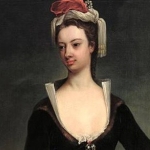
FLAVIA. THE wretched FLAVIA on her couch reclin'd,
Thus breath'd the anguish of a wounded mind ;
A glass revers'd in her right hand she bore,
For now she shun'd the face she sought before.
' How am I chang'd ! alas ! how am I grown
' A frightful spectre, to myself unknown !
' Where's my Complexion ? where the radiant Bloom,
Read Poem Thus breath'd the anguish of a wounded mind ;
A glass revers'd in her right hand she bore,
For now she shun'd the face she sought before.
' How am I chang'd ! alas ! how am I grown
' A frightful spectre, to myself unknown !
' Where's my Complexion ? where the radiant Bloom,
0
Cities by H.D.
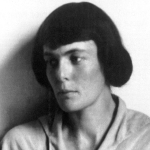
Can we believe—by an effort
comfort our hearts:
it is not waste all this,
not placed here in disgust,
street after street,
each patterned alike,
no grace to lighten
a single house of the hundred
crowded into one garden-space.
Crowded—can we believe,
not in utter disgust,
in ironical play—
but the maker of cities grew faint
with the beauty of temple
Read Poem comfort our hearts:
it is not waste all this,
not placed here in disgust,
street after street,
each patterned alike,
no grace to lighten
a single house of the hundred
crowded into one garden-space.
Crowded—can we believe,
not in utter disgust,
in ironical play—
but the maker of cities grew faint
with the beauty of temple
0
A Prayer for My Daughter by William Butler Yeats

Once more the storm is howling, and half hid
Under this cradle-hood and coverlid
My child sleeps on. There is no obstacle
But Gregory's Wood and one bare hill
Whereby the haystack and roof-levelling wind,
Bred on the Atlantic, can be stayed;
And for an hour I have walked and prayed
Because of the great gloom that is in my mind.
I have walked and prayed for this young child an hour,
And heard the sea-wind scream upon the tower,
And under the arches of the bridge, and scream
In the elms above the flooded stream;
Imagining in excited reverie
That the future years had come
Read Poem Under this cradle-hood and coverlid
My child sleeps on. There is no obstacle
But Gregory's Wood and one bare hill
Whereby the haystack and roof-levelling wind,
Bred on the Atlantic, can be stayed;
And for an hour I have walked and prayed
Because of the great gloom that is in my mind.
I have walked and prayed for this young child an hour,
And heard the sea-wind scream upon the tower,
And under the arches of the bridge, and scream
In the elms above the flooded stream;
Imagining in excited reverie
That the future years had come
0
from Gilgamesh: Tablet 11 by David Ferry

i
Gilgamesh spoke and said to the old man then:
"When I looked at you I thought that you were not
a man, one made like me; I had resolved
to challenge you as one might challenge a demon,
a stranger-adversary. But now I see
that you are Utnapishtim, made like me,
a man, the one I sought, the one from whom
Read Poem Gilgamesh spoke and said to the old man then:
"When I looked at you I thought that you were not
a man, one made like me; I had resolved
to challenge you as one might challenge a demon,
a stranger-adversary. But now I see
that you are Utnapishtim, made like me,
a man, the one I sought, the one from whom
0
from Idylls of the King: The Last Tournament by Alfred, Lord Tennyson

Dagonet, the fool, whom Gawain in his mood
Had made mock-knight of Arthur's Table Round,
At Camelot, high above the yellowing woods,
Danced like a wither'd leaf before the hall.
And toward him from the hall, with harp in hand,
And from the crown thereof a carcanet
Of ruby swaying to and fro, the prize
Of Tristram in the jousts of yesterday,
Came Tristram, saying, "Why skip ye so, Sir Fool?"
For Arthur and Sir Lancelot riding once
Far down beneath a winding wall of rock
Heard a child wail. A stump of oak half-dead.
From roots like some black coil of carven snakes,
Clutch'd at the crag, and started thro' mid air
Read Poem Had made mock-knight of Arthur's Table Round,
At Camelot, high above the yellowing woods,
Danced like a wither'd leaf before the hall.
And toward him from the hall, with harp in hand,
And from the crown thereof a carcanet
Of ruby swaying to and fro, the prize
Of Tristram in the jousts of yesterday,
Came Tristram, saying, "Why skip ye so, Sir Fool?"
For Arthur and Sir Lancelot riding once
Far down beneath a winding wall of rock
Heard a child wail. A stump of oak half-dead.
From roots like some black coil of carven snakes,
Clutch'd at the crag, and started thro' mid air
0
BEAMS 21, 22, 23, The Song of Orpheus by Ronald Johnson

Tree
into the World,
Man
the chosen
Rose out of Chaos:
Song
Thunder amid held daffodil,
the hills of yellow celandine in sudden sun
electrum
"when the light walks."
When the light walks, clockwise, counterclockwise,
atoms memorize the firefly's wing
silhouette twenty-foot elm leaf
Read Poem into the World,
Man
the chosen
Rose out of Chaos:
Song
Thunder amid held daffodil,
the hills of yellow celandine in sudden sun
electrum
"when the light walks."
When the light walks, clockwise, counterclockwise,
atoms memorize the firefly's wing
silhouette twenty-foot elm leaf
0
Delia 31: Look, Delia, how we 'steem the half-blown rose (1592 version) by Samuel Daniel

Look, Delia, how we 'steem the half-blown rose,
The image of thy blush and summer's honour,
Whilst in her tender green she doth enclose
That pure sweet beauty time bestows upon her.
No sooner spreads her glory in the air
But straight her full-blown pride is in declining;
She then is scorn'd that late adorn'd the fair:
So clouds thy beauty after fairest shining.
No April can revive thy wither'd flowers,
Whose blooming grace adorns thy beauty now;
Swift speedy time, feather'd with flying hours,
Dissolves the beauty of the fairest brow.
O let not then such riches waste in vain,
But love whilst that thou mayst be lov'd again.
0
Paradise Lost: Book 4 (1674 version) by John Milton

O For that warning voice, which he who saw
Th' Apocalyps, heard cry in Heaven aloud,
Then when the Dragon, put to second rout,
Came furious down to be reveng'd on men,
Wo to the inhabitants on Earth! that now,
While time was, our first-Parents had bin warnd
The coming of thir secret foe, and scap'd
Haply so scap'd his mortal snare; for now
Satan, now first inflam'd with rage, came down,
The Tempter ere th' Accuser of man-kind,
To wreck on innocent frail man his loss
Of that first Battel, and his flight to Hell:
Yet not rejoycing in his speed, though bold,
Far off and fearless, nor with cause to boast,
Begins his dire attempt, which nigh the birth
Read Poem Th' Apocalyps, heard cry in Heaven aloud,
Then when the Dragon, put to second rout,
Came furious down to be reveng'd on men,
Wo to the inhabitants on Earth! that now,
While time was, our first-Parents had bin warnd
The coming of thir secret foe, and scap'd
Haply so scap'd his mortal snare; for now
Satan, now first inflam'd with rage, came down,
The Tempter ere th' Accuser of man-kind,
To wreck on innocent frail man his loss
Of that first Battel, and his flight to Hell:
Yet not rejoycing in his speed, though bold,
Far off and fearless, nor with cause to boast,
Begins his dire attempt, which nigh the birth
0
from The Botanic Garden, “The Economy of Vegetation”: Canto I by Erasmus Darwin
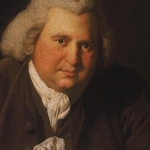
Argument
The Genius of the place invites the Goddess of Botany, 1. She descends, is received by Spring, and the Elements, 59. Addresses the Nymphs of Fire. Star-light Night seen in the Camera Obscura, 81. I. Love created the Universe. Chaos explodes. All the Stars revolve. God, 97. II. Shooting Stars. Lightning. Rainbow. Colours of the Morning and Evening Skies. Exterior Atmosphere of inflammable Air. Twilight. Fire-balls. Aurora Borealis. Planets. Comets. Fixed Stars. Sun’s Orb, 115. III. 1. Fires of the Earth’s Centre. Animal Incubation, 137. 2. Volcanic Mountains. Venus visits the Cyclops, 149. IV. Heat confined on the Earth by the Air. Phosphoric lights in the Evening. Bolognian Stone. Calcined Shells. Memnon’s Harp, 173. Ignis fatuus. Luminous Flowers. Glow-worm. Fire-fly. Luminous Sea-insects. Electric Eel. Eagle armed with Lightning, 189. V. 1. Discovery of Fire. Medusa, 209. 2. The chemical Properties of Fire. Phosphorus. Lady in Love, 223. 3. Gunpowder, 237. VI. Steam-engine applied to Pumps, Bellows, Water-engines, Corn-mills, Coining, Barges, Waggons, Flying-chariots, 253. Labours of Hercules. Abyla and Calpe, 297. VII. 1. Electric Machine. Hesperian Dragon. Electric Kiss. Halo round the heads of Saints. Electric Shock. Fairy-rings, 335. 2. Death of Professor Richman, 371. 3. Franklin draws Lightning from the Clouds. Cupid snatches the Thunderbolt from Jupiter, 383. VIII. Phosphoric Acid and Vital Heat produced in the Blood. The great Egg of Night, 399. IX. Western Wind unfettered. Naiad released. Frost assailed. Whale attacked, 421. X. Buds and Flowers expanded by Warmth, Electricity, and Light. Drawings with colourless sympathetic Inks; which appear when warmed by the Fire, 457. XI. Sirius. Jupiter and Semele. Nothern Constellations. Ice-Islands navigated into the Tropic Seas. Rainy Monsoons, 497. XII. Points erected to procure Rain. Elijah on Mount Carmel, 549. Departure of the Nymphs of Fire like Sparks from artificial Fireworks, 587.
“Stay your rude steps; whose throbbing breasts infold
The legion-fiends of Glory, or of Gold!
Stay! whose false lips seductive simpers part,
While Cunning nestles in the harlot-heart!—
For you no Dryads dress the roseate bower,
For you no Nymphs their sparkling vases pour;
Unmark’d by you, light Graces swim the green,
And hovering Cupids aim their shafts, unseen.
“But Thou! whose mind the well-attemper’d ray
Of Taste and Virtue lights with purer day;
Read Poem The Genius of the place invites the Goddess of Botany, 1. She descends, is received by Spring, and the Elements, 59. Addresses the Nymphs of Fire. Star-light Night seen in the Camera Obscura, 81. I. Love created the Universe. Chaos explodes. All the Stars revolve. God, 97. II. Shooting Stars. Lightning. Rainbow. Colours of the Morning and Evening Skies. Exterior Atmosphere of inflammable Air. Twilight. Fire-balls. Aurora Borealis. Planets. Comets. Fixed Stars. Sun’s Orb, 115. III. 1. Fires of the Earth’s Centre. Animal Incubation, 137. 2. Volcanic Mountains. Venus visits the Cyclops, 149. IV. Heat confined on the Earth by the Air. Phosphoric lights in the Evening. Bolognian Stone. Calcined Shells. Memnon’s Harp, 173. Ignis fatuus. Luminous Flowers. Glow-worm. Fire-fly. Luminous Sea-insects. Electric Eel. Eagle armed with Lightning, 189. V. 1. Discovery of Fire. Medusa, 209. 2. The chemical Properties of Fire. Phosphorus. Lady in Love, 223. 3. Gunpowder, 237. VI. Steam-engine applied to Pumps, Bellows, Water-engines, Corn-mills, Coining, Barges, Waggons, Flying-chariots, 253. Labours of Hercules. Abyla and Calpe, 297. VII. 1. Electric Machine. Hesperian Dragon. Electric Kiss. Halo round the heads of Saints. Electric Shock. Fairy-rings, 335. 2. Death of Professor Richman, 371. 3. Franklin draws Lightning from the Clouds. Cupid snatches the Thunderbolt from Jupiter, 383. VIII. Phosphoric Acid and Vital Heat produced in the Blood. The great Egg of Night, 399. IX. Western Wind unfettered. Naiad released. Frost assailed. Whale attacked, 421. X. Buds and Flowers expanded by Warmth, Electricity, and Light. Drawings with colourless sympathetic Inks; which appear when warmed by the Fire, 457. XI. Sirius. Jupiter and Semele. Nothern Constellations. Ice-Islands navigated into the Tropic Seas. Rainy Monsoons, 497. XII. Points erected to procure Rain. Elijah on Mount Carmel, 549. Departure of the Nymphs of Fire like Sparks from artificial Fireworks, 587.
“Stay your rude steps; whose throbbing breasts infold
The legion-fiends of Glory, or of Gold!
Stay! whose false lips seductive simpers part,
While Cunning nestles in the harlot-heart!—
For you no Dryads dress the roseate bower,
For you no Nymphs their sparkling vases pour;
Unmark’d by you, light Graces swim the green,
And hovering Cupids aim their shafts, unseen.
“But Thou! whose mind the well-attemper’d ray
Of Taste and Virtue lights with purer day;
0
The Book of Thel by William Blake
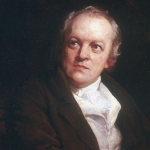
THEL'S MOTTO
Does the Eagle know what is in the pit?
Or wilt thou go ask the Mole:
Can Wisdom be put in a silver rod?
Or Love in a golden bowl? I
The daughters of Mne Seraphim led round their sunny flocks.
All but the youngest; she in paleness sought the secret air.
To fade away like morning beauty from her mortal day:
Read Poem Does the Eagle know what is in the pit?
Or wilt thou go ask the Mole:
Can Wisdom be put in a silver rod?
Or Love in a golden bowl? I
The daughters of Mne Seraphim led round their sunny flocks.
All but the youngest; she in paleness sought the secret air.
To fade away like morning beauty from her mortal day:
0
Sonnet 2: When forty winters shall besiege thy brow by William Shakespeare

When forty winters shall besiege thy brow
And dig deep trenches in thy beauty’s field,
Thy youth’s proud livery, so gazed on now,
Will be a tattered weed, of small worth held.
Then being asked where all thy beauty lies—
Where all the treasure of thy lusty days—
To say within thine own deep-sunken eyes
Were an all-eating shame and thriftless praise.
Read Poem And dig deep trenches in thy beauty’s field,
Thy youth’s proud livery, so gazed on now,
Will be a tattered weed, of small worth held.
Then being asked where all thy beauty lies—
Where all the treasure of thy lusty days—
To say within thine own deep-sunken eyes
Were an all-eating shame and thriftless praise.
0
Adonais: An Elegy on the Death of John Keats by Percy Bysshe Shelley

I
I weep for Adonais—he is dead!
Oh, weep for Adonais! though our tears
Thaw not the frost which binds so dear a head!
And thou, sad Hour, selected from all years
To mourn our loss, rouse thy obscure compeers,
And teach them thine own sorrow, say: "With me
Died Adonais; till the Future dares
Forget the Past, his fate and fame shall be
An echo and a light unto eternity!"
II
Where wert thou, mighty Mother, when he lay,
When thy Son lay, pierc'd by the shaft which flies
In darkness? where was lorn Urania
Read Poem I weep for Adonais—he is dead!
Oh, weep for Adonais! though our tears
Thaw not the frost which binds so dear a head!
And thou, sad Hour, selected from all years
To mourn our loss, rouse thy obscure compeers,
And teach them thine own sorrow, say: "With me
Died Adonais; till the Future dares
Forget the Past, his fate and fame shall be
An echo and a light unto eternity!"
II
Where wert thou, mighty Mother, when he lay,
When thy Son lay, pierc'd by the shaft which flies
In darkness? where was lorn Urania
0
Each and All by Ralph Waldo Emerson
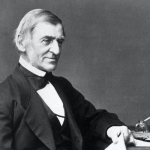
Little thinks, in the field, yon red-cloaked clown,
Of thee from the hill-top looking down;
The heifer that lows in the upland farm,
Far-heard, lows not thine ear to charm;
The sexton, tolling his bell at noon,
Deems not that great Napoleon
Stops his horse, and lists with delight,
Whilst his files sweep round yon Alpine height;
Read Poem Of thee from the hill-top looking down;
The heifer that lows in the upland farm,
Far-heard, lows not thine ear to charm;
The sexton, tolling his bell at noon,
Deems not that great Napoleon
Stops his horse, and lists with delight,
Whilst his files sweep round yon Alpine height;
0
Epistles to Several Persons: Epistle II: To a Lady on the Characters of Women by Alexander Pope

Nothing so true as what you once let fall,
"Most Women have no Characters at all."
Matter too soft a lasting mark to bear,
And best distinguish'd by black, brown, or fair.
How many pictures of one nymph we view,
All how unlike each other, all how true!
Arcadia's Countess, here, in ermin'd pride,
Read Poem "Most Women have no Characters at all."
Matter too soft a lasting mark to bear,
And best distinguish'd by black, brown, or fair.
How many pictures of one nymph we view,
All how unlike each other, all how true!
Arcadia's Countess, here, in ermin'd pride,
0